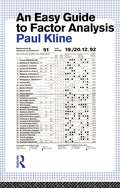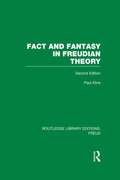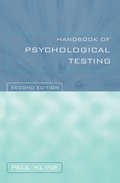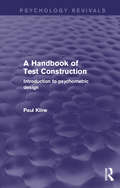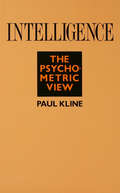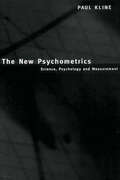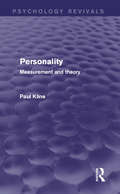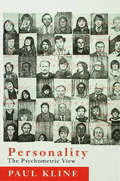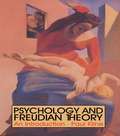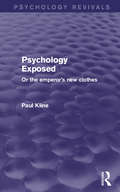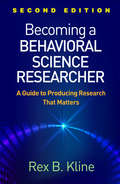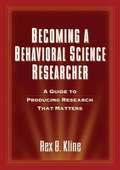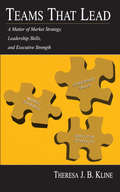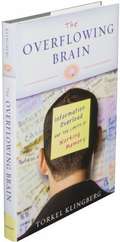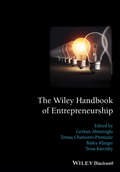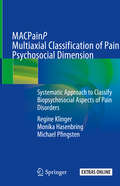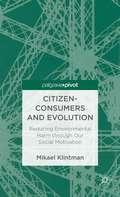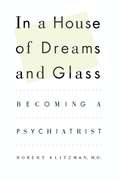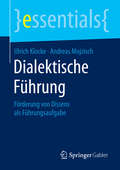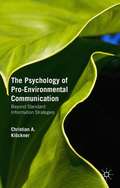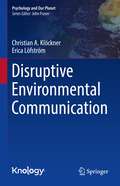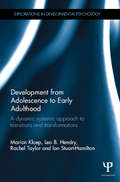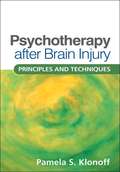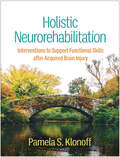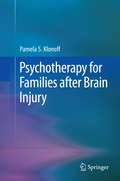- Table View
- List View
An Easy Guide to Factor Analysis
by Paul KlineFactor analysis is a statistical technique widely used in psychology and the social sciences. With the advent of powerful computers, factor analysis and other multivariate methods are now available to many more people. An Easy Guide to Factor Analysis presents and explains factor analysis as clearly and simply as possible. The author, Paul Kline, carefully defines all statistical terms and demonstrates step-by-step how to work out a simple example of principal components analysis and rotation. He further explains other methods of factor analysis, including confirmatory and path analysis, and concludes with a discussion of the use of the technique with various examples.An Easy Guide to Factor Analysis is the clearest, most comprehensible introduction to factor analysis for students. All those who need to use statistics in psychology and the social sciences will find it invaluable. Paul Kline is Professor of Psychometrics at the University of Exeter. He has been using and teaching factor analysis for thirty years. His previous books include Intelligence: the psychometric view (Routledge 1990) and The Handbook of Psychological Testing (Routledge 1992).
Fact and Fantasy in Freudian Theory (Routledge Library Editions: Freud)
by Paul KlineOriginally published in 1972, this second edition in 1981 was fully revised and updated to cover recent developments in the field at the time. Fact and Fantasy in Freudian Theory was written to answer many questions and criticisms surrounding psychoanalysis. How much, if any, of Freudian theory is verifiable according to the usual criteria of scientific enquiry? Much work had been carried out at the time to discover which parts of Freudian theory are verifiable and which insupportable by experiment. In this book Dr Kline surveys this vast body of work. He takes, one by one, the central postulates of Freudian psychology and discusses the experiments which have been performed to test them. He scrutinizes each test, examines its methodology and its findings and weighs up its value. For some of the theories, it will be seen, there is no evidence whatsoever; for others, on the other hand, there is impressive and sometimes incontrovertible experimental support – for example, for the theory of repression. This work will continue to be an invaluable, highly detailed reference work for those involved with Freud’s work, and a book of great interest to those concerned with the method of psychological enquiry in general.
Handbook of Psychological Testing
by Paul KlineSince publication in its first edition the Handbook of Psychological Testing has become the standard text for organisational and educational psychologists. It offers the only comprehensicve, modern and clear account of the whole of the field of psychometrics. It covers psychometric theory, the different kinds of psychological test, applied psychological testing, and the evaluation of the best published psychological tests. It is outstanding for its detailed and complete coverage of the field, its clarity (even for the non-mathematical) and its emphasis on the practical application of psychometric theory in psychology and education, as well as in vocational, occupational and clinical fields.For this second edition the Handbook has been extensively revised and updated to include the latest research and thinking in the field. Unlike other work in this area, it challenges the scientific rigour of conventional psychometrics and identifies groundbreaking new ways forward.
A Handbook of Test Construction: Introduction to Psychometric Design (Psychology Revivals)
by Paul KlinePsychological tests provide reliable and objective standards by which individuals can be evaluated in education and employment. Therefore accurate judgements must depend on the reliability and quality of the tests themselves. Originally published in 1986, this handbook by an internationally acknowledged expert provided an introductory and comprehensive treatment of the business of constructing good tests. Paul Kline shows how to construct a test and then to check that it is working well. Covering most kinds of tests, including computer presented tests of the time, Rasch scaling and tailored testing, this title offers: a clear introduction to this complex field; a glossary of specialist terms; an explanation of the objective of reliability; step-by-step guidance through the statistical procedures; a description of the techniques used in constructing and standardizing tests; guidelines with examples for writing the test items; computer programs for many of the techniques. Although the computer testing will inevitably have moved on, students on courses in occupational, educational and clinical psychology, as well as in psychological testing itself, would still find this a valuable source of information, guidance and clear explanation.
Intelligence: The Psychometric View
by Paul KlinePaul Kline's latest book provides a readable modern account of the psychometric view of intelligence. It explains factor analysis and the construction of intelligence tests, and shows how the resulting factors provide a picture of human abilities. Written to be clear and concise it none the less provides a rigorous account of the psychometric view of intelligence.
The New Psychometrics: Science, Psychology and Measurement
by Paul KlineMany psychological factors are little more than statistical descriptions of particular sets of data and have no real significance. Paul Kline uses his long and extensive knowledge of psychological measurement to argue that truly scientific forms of measurement could be developed to create a new psychometrics. This would transform the basis of psychology and change it from a social science to a pure science.
Personality: Measurement and Theory (Psychology Revivals)
by Paul KlineOriginally published in 1983 and written in the tradition of the British School of Psychology, Spearman, Burt, Eysenck, Cattell, this book from a well-known author was exceptional at the time in its attempt to wed quantification and psychological theory in the study of personality. The student is presented with a discussion of the different methods of measuring personality and the various findings which have been made. The results are then discussed in the light of psychological theories of personality and here the author stresses the need for a theory with a properly quantified bias. However, the emphasis on findings from measurement and not the measurement itself makes the book psychological, truly about personality and not simply another text on psychological measurement.
Personality: The Psychometric View (Psychology Revivals Ser.)
by Paul KlineAlthough the psychometric view of personality is well established, it is little dealt with in most textbooks. Personality: the Psychometric View describes clearly the methods and findings of the psychometric testing of personality. Leading author Paul Kline discusses the theory of personality testing and the main types of personality test, as well as their practical application to occupational, educational and clinical psychology. Personality: the Psychometric View is the only text on the psychometric view of personality which is written with enough clarity to be suited to students. It will be valuable to all students of psychology, as well as postgraduates designing tests, and those in education and the social sciences.
Psychology and Freudian Theory: An Introduction
by Paul KlineThis is a clear and accessible introduction to Freudian theory and its status in modern psychology. Paul Kline examines the evidence for and against psychoanalytic theories and shows that, far from being out of date, they can be supported by modern psychological research. He writes for the student and the non-specialist, drawing on numerous, often lighthearted, examples taken from real life and pointing to the implications of his findings for educational, clinical and industrial psychologists.After a brief introduction to Freudian theory and its development through the work of Jung, Adler and Melanie Klein, Paul Kline describes the objections that have been raised to psychoanalytic theories and some possible answers Important aspects of Freudian theory concerning child development, the Oedipus complex, dreaming and the nature of the unconscious are examined to see whether they can be said to be true or false, and are compared when possible with their modern psychological counterparts. The book concludes with a discussion of the broader social implications of Freudian theory and its value for those concerned with child development - parents and educators - and for those involved in mental health.Psychology and Freudian Theory will be welcomed by all those with an interest in human behaviour and by the wide spectrum of social studies students.
Psychology Exposed: Or the Emperor's New Clothes (Psychology Revivals)
by Paul KlineOriginally published in 1988, in this personal review of the state of academic psychology, Paul Kline draws attention to the way in which his peers at the time studiously avoided such threatening matters as human feelings and emotions, unconscious ‘complexes’ – in short anything that could be called the human psyche. His erudite, amusing, and provocative text outlines the crucial influence of the development of scientific method before examining key experiments within cognitive psychology and cognitive science, psychometrics, social psychology, and animal behaviour. Is most of experimental psychology trivial, redundant, and irrelevant? The academic subject cannot continue to ignore its critics, he argued, and must solve its problems by means of radical solutions. Whether they support or refute Professor Kline’s arguments, students and professionals alike will still enjoy this original book.
Becoming a Behavioral Science Researcher, Second Edition: A Guide to Producing Research That Matters
by Rex B. KlineAcclaimed for helping novice behavioral scientists hit the ground running as producers of meaningful research, this text now has been extensively revised with 55% new material, including current guidance on open science; transparency; replication; and quantitative, qualitative, and mixed methods reporting standards. The book provides the conceptual knowledge and practical skills needed to bridge the gap between introductory research design and analysis courses and execution of an independent study. In a candid, conversational style, Rex B. Kline guides the reader to choose appropriate research designs and analysis options; avoid common fallacies in interpreting the outcomes of statistical tests; make informed measurement choices; screen data for problems that could yield inaccurate results; and craft effective theses, journal articles, and presentations. Revised pedagogical features include engaging examples from published studies and student theses, as well as end-of-chapter exercises with answers. New to This Edition *Addresses critical "research crises" that have come to the fore in the last decade--and ways to remedy them. *New chapters on the replication crisis, reporting standards, the open-science movement, and statistics reform. *Extensively revised chapters on effect size estimation and psychometrics. *Updated discussions of how to write publishable journal articles and create effective presentations.
Becoming a Behavioral Science Researcher
by Rex Kline Robin HensonStudents and beginning researchers often discover that their introductory statistics and methods courses have not fully equipped them to plan and execute their own behavioral research studies. This indispensable book bridges the gap between coursework and conducting independent research. With clarity and wit, the author helps the reader build needed skills to formulate a precise, meaningful research question; understand the pros and cons of widely used research designs and analysis options; correctly interpret the outcomes of statistical tests; make informed measurement choices for a particular study; manage the practical aspects of data screening and preparation; and craft effective journal articles, oral presentations, and posters. Including annotated examples and recommended readings, most chapters feature theoretical and computer-based exercises; an answer appendix at the back of the book allows readers to check their work.
Teams That Lead: A Matter of Market Strategy, Leadership Skills, and Executive Strength
by Theresa J.B. KlineTeams That Lead: A Matter of Market Strategy, Leadership Skills, and Executive Strength strikes a balance between the current scholarly literature that exists in these fields and its impact on teams. The focus on leading executive teams makes this book unique. It provides three lenses with which to view team leadership and how those various lenses can assist in making teams more effective. The first focuses on paying close attention to the market strategy of the organization and how it should drive key decisions. The second focuses on the multiple roles of the designated leader of a team. The third focus shifts to executive teams and how to be a highly effective team player in the executive environment. Each section is grounded in theoretical and empirical evidence. How this information can then be translated into useful knowledge for practitioners and researchers follows. To make it practical, however, the book provides examples, cases, measuring tools, and questions. This book will be of interest to students and professors in MBA programs, organizational behavior, public policy, and psychology courses. Practitioners, such as consultants, facilitators, trainers, and executive coaches will also be interested.
The Overflowing Brain
by Torkel Klingberg Elkhonon GoldbergAs the pace of technological change accelerates, we are increasingly experiencing a state of information overload. Statistics show that we are interrupted every three minutes during the course of the work day. Multitasking between email, cell-phone, text messages, and four or five websites while listening to an iPod forces the brain to process more and more informaton at greater and greater speeds. And yet the human brain has hardly changed in the last 40,000 years. Are all these high-tech advances overtaxing our Stone Age brains or is the constant flood of information good for us, giving our brains the daily exercise they seem to crave? In The Overflowing Brain, cognitive scientist Torkel Klingberg takes us on a journey into the limits and possibilities of the brain. He suggests that we should acknowledge and embrace our desire for information and mental challenges, but try to find a balance between demand and capacity. Klingberg explores the cognitive demands, or "complexity," of everyday life and how the brain tries to meet them. He identifies different types of attention, such as stimulus-driven and controlled attention, but focuses chiefly on "working memory," our capacity to keep information in mind for short periods of time. Dr Klingberg asserts that working memory capacity, long thought to be static and hardwired in the brain, can be improved by training, and that the increasing demands on working memory may actually have a constructive effect: as demands on the human brain increase, so does its capacity. The book ends with a discussion of the future of brain development and how we can best handle information overload in our everyday lives. Klingberg suggests how we might find a balance between demand and capacity and move from feeling overwhelmed to deeply engaged.
The Wiley Handbook of Entrepreneurship
by Bailey Klinger Gorkan Ahmetoglu Tessa Karcisky Tomas Chamorro-PremuzicWritten by leading scholars, The Wiley Handbook of Entrepreneurship provides a distinctive overview of methodological, theoretical and paradigm changes in the area of entrepreneurship research. It is divided into four parts covering history and theory, individual differences and creativity, organizational aspects of innovation including intrapreneurship, and macroeconomic aspects such as social entrepreneurship and entrepreneurship in developing countries. The result is a must-have resource for seasoned researchers and newcomers alike, as well as practitioners and advanced students of business, entrepreneurship, and social and organizational psychology.
MACPainP Multiaxial Classification of Pain Psychosocial Dimension: Systematic Approach to Classify Biopsychosocial Aspects of Pain Disorders
by Regine Klinger Monika Hasenbring Michael PfingstenThis book offers a diagnostic tool for physicians and psychologists who want to systematically document pain within a multimodal structure. MACPainP (multiaxial classification of pain-psychosocial dimension) is a systematic, comprehensive and clinically oriented diagnostic instrument for evaluating pain-related disorders, and includes differentiated descriptions to enable syndromes to be systematized and diagnoses compared. MACPainP can be used as a professional add-on for the International Classification of Diseases ICD-10 as well as the upcoming pain classification ICD-11, released by WHO. This clearly structured book provides an easy introduction to the biopsychological aspects of pain disorders, to allow a nuanced approach to the psychological diagnosis of pain patients. It discusses possible comorbidities (e.g. depressive disorders, anxiety disorders) as well as concrete behavior-related steps for pain-related psychological and medical treatments. An essential reference for physicians and psychologists in the field of pain therapy, it is part of the learning European Pain Federation Curriculum (EFIC) of pain therapists.
Citizen-Consumers and Evolution: Reducing Environmental Harm through Our Social Motivation
by Mikael KlintmanThis book develops a groundbreaking, novel approach to examining ethical consumer behaviour from the perspective of evolutionary theory, illustrating the deeply rooted potentials and limits within society for reducing environmental harm.
In a House of Dreams and Glass: Becoming a Psychiatrist
by Robert KlitzmanFresh from medical school, Robert Klitzman began his residency in psychiatry with excitement and a sense of mission. But he was not prepared for what he found inside the city psychiatric center where he was to spend three grueling years. In truth, as Dr. Klitzman's absorbing account of his apprenticeship reveals, he never ceased to be surprised--by his patients, by the senior psychiatrists' conflicting advice on how to help them, and by the unpredictable results of the therapies, both psychoanalytic and biologic, that he and his fellow residents practiced. Nights in the emergency room, professional controversy, the minefield of hospital politics, the stress of his own therapy--everything is here, in a passionate and illuminating analysis of a doctor's struggle against tremendous odds to banish his patients' demons.
Dialektische Führung: Förderung von Dissens als Führungsaufgabe (essentials)
by Ulrich Klocke Andreas MojzischUlrich Klocke und Andreas Mojzisch stellen mit der dialektischen Führung einen neuen Ansatz vor, bei dem Führungskräfte Dissens in ihrem Team fördern, um Entscheidungen zu verbessern. Auf der Basis von Führungs- und Gruppenforschung sowie aktuellen Fallbeispielen liefert das Essential konkrete Verhaltensempfehlungen, wie ührungskräfte dabei vorgehen sollten, damit der Dissens nicht zu Konflikten auf der Beziehungsebene führt und am Ende alle Beteiligten die getroffene Entscheidung akzeptieren.
The Psychology of Pro-Environmental Communication: Beyond Standard Information Strategies
by Christian A. KlöcknerThe environment is part of everyone's life but there are difficulties in communicating complex environmental problems, such as climate change, to a lay audience. In this book Klöckner defines environmental communication, providing a comprehensive and up-to-date analysis of the issues involved in encouraging pro-environmental behaviour.
Disruptive Environmental Communication (Psychology and Our Planet)
by Christian A. Klöckner Erica LöfströmThis book proposes a radical change in communication strategies about environmental problems, advocating for more active and emotionally engaging methods that drive people to action. Based on new theoretical developments and research, the book provides a new framework for designing such communication strategies and suggests practical implementations of these ideas for practitioners, policy-makers, and scientists. Among the topics discussed: • The psychology of change and why disruptive communication is necessary • Virtual reality technologies used to communicate complex ideas • Reflections on the value of science fiction and climate fiction in addressing environmental issues • Analyzing the impact of youth climate activism Disruptive Environmental Communication provides an innovative new framework for designing effective communication strategies to address large-scale environmental problems, challenging the assumption that environmental problems can be communicated and handled through non-disruptive methods.
Development from Adolescence to Early Adulthood: A dynamic systemic approach to transitions and transformations (Explorations in Developmental Psychology)
by Marion Kloep Leo Hendry Rachel Taylor Ian Stuart-HamiltonTraditionally, the subject of adolescent development has been explored using a stage based approach, often with an emphasis on the potential risks and problems of adolescence. Taking a different approach, in this book the authors draw upon a wealth of research to examine the period of development from adolescence to adulthood from a dynamic systems perspective; investigating multi-facetted, multi-variable explanations surrounding the transitions and consequent transformations that occur in young peoples’ lives, as they change from teenagers to young adults. The book considers the social institutions, interactions, contexts and relationships that influence each other, and young people, during developmental transitions. Topics covered include: dynamic systems theory in developmental and social psychology adolescents in social contexts compliments, lies and other social skills school, university and labour market transition adolescent health in a lifespan context family dynamics. Development from Adolescence to Early Adulthood will be key reading for academics, researchers and postgraduate students in the field of developmental psychology, as well as clinicians and policy makers working with young people.
Psychotherapy after Brain Injury
by Pamela KlonoffThis book presents hands-on tools for addressing the multiple ways that brain injury can affect psychological functioning and well-being. The author is a leader in the field who translates her extensive clinical experience into clear-cut yet flexible guidelines that therapists can adapt for different challenges and settings. With a focus on facilitating awareness, coping, competence, adjustment, and community reintegration, the book features helpful case examples and reproducible handouts and forms. It shows how to weave together individual psychotherapy, cognitive retraining, group and family work, psychoeducation, and life skills training, and how to build and maintain a collaborative therapeutic relationship.
Holistic Neurorehabilitation: Interventions to Support Functional Skills after Acquired Brain Injury
by Pamela S. KlonoffHighly practical and comprehensive, this book provides a multimodal framework for helping patients with acquired brain injuries to identify and achieve meaningful functional goals in the home and community. In a convenient large-size format, the volume features rich case examples and interdisciplinary tools and strategies. Post-acute cognitive, physical, communication, emotional, vocational, interpersonal, family, and quality-of-life domains are all addressed, using state-of-the-art restorative and compensatory approaches. Coverage includes both individual and group therapies. Fifty reproducible forms and handouts can be photocopied from the book or downloaded from the companion website. The website also features a supplemental chapter on efficacy and outcomes research in neurorehabilitation, appendices with helpful resources, color versions of selected figures, and more.
Psychotherapy for Families after Brain Injury
by Pamela S. KlonoffWhether caused by illness, accident, or incident, brain injury requires multi-tiered resources for the patient and considerable external care and support. When recovery is sidelined by depression, anger, grief, or turmoil, family members and the support network have critical roles to play and need their own guidance and compassionate therapeutic interventions. Psychotherapy for Families after Brain Injury offers theoretical frameworks and eclectic techniques for working effectively with adult patients and their families at the initial, active and post-treatment phases of rehabilitation. This practical reference clarifies roles and relationships of the support network in interfacing with the loved one and addresses the understandably devastating and sometimes derailing emotions and psychosocial adversities. The content promotes psychoeducation and guided exercises, delineates "helpful hints" and coping tools and proffers multimedia resources to overcome hurdles Constructs of awareness, acceptance and realism for all parties are woven throughout, along with ideas to enhance the support network's commitment, adjustment, positivity, hope and longevity. Case excerpts, instructive quotes from caregivers and nuggets of clinical advice assist in analyzing these and other topics in salient detail: The impact of brain injury on different family members. Treatment themes in early family sessions. Family therapy for moderate to severe brain injury, concussion and postconcussion syndrome. Family therapy after organic brain injury: stroke, anoxia, tumor, seizure disorders. Family group treatment during active rehabilitation. End-of-life and existential considerations and positive aspects of care giving. Aftercare group therapy for long-term needs. The hands-on approach demonstrated in Psychotherapy for Families after Brain Injury will enhance the demanding work of a range of professionals, including neuropsychologists, clinical psychologists, rehabilitation psychologists, family therapists, marriage and family counselors, psychiatrists, behavioral/mental health counselors, clinical social workers, rehabilitation specialists such as speech-language pathologists, physical and occupational therapists, and graduate students in the helping professions.
